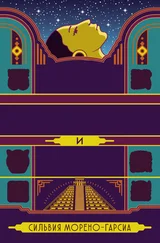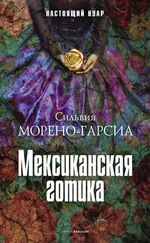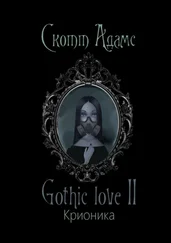“It’s not real,” Francis said.
“But can you see it?” Noemí asked.
“It’s the gloom. It wants to make us believe things. Go, go quickly.”
She walked faster and reached the bottom of the stairs. Catalina came walking right behind her and then Francis, who sounded out of breath.
“Are you all right?” Noemí asked him.
“I’m not feeling great,” he said. “We need to keep moving. Ahead it seems to be a dead end; there’s a walk-in pantry and inside it there’s a cupboard. It’s painted yellow. It can be moved aside.”
She found a door and inside it the walk-in pantry he had mentioned. The floor was made of stone, and there were hooks to hang meat. A naked light bulb with a long chain dangled from the ceiling. She pulled the chain, illuminating the small space. All the shelves were empty. If this place had stored food, it had been a long time ago, for there was dark mold running up and down the walls, which would have rendered it completely unsuitable for such use.
She saw the yellow cupboard. Its top was arched, and it had two glazed doors and two large drawers at the bottom, marks and scuffs marring its surface. It had been lined in yellow fabric, to better match its outside.
“We should be able to push it to the left,” Francis said. “And there, in the bottom of the cupboard, there’s a bag.” He still sounded like he was trying to catch his breath.
Noemí bent down and pulled open the cupboard’s bottom drawer. She found a brown canvas bag. Catalina unzipped it for her. Inside of this bag there was an oil lamp, a compass, two sweaters. It was Francis’s unfinished escape kit. It would have to do.
“We push it left?” she asked, stuffing the compass in her pocket.
Francis nodded. “But first, we should block the entrance here,” he said, pointing at the door where they’d come in.
“There’s that bookcase there we can use,” she replied.
Catalina and Francis proceeded to drag a rickety wooden bookcase against the door. It was not a perfect barricade, but it did the job well enough.
Safely hidden in the small room, Noemí handed one sweater to Catalina and the other to Francis, for it would no doubt be chilly outside. Then it was time to tackle the cupboard. It looked heavy, but surprisingly they were able to slide it to the side with less effort than the bookcase. A dark, weathered door was revealed.
“It leads to the family crypt,” Francis said. “Then it’s a question of walking down the mountain to the town.”
“I don’t want to go there,” Catalina whispered. She had not spoken until now, and the sound startled Noemí. Catalina pointed at the door. “The dead sleep there. I don’t want to go. Listen.”
Noemí heard it then, a deep, deep groan. It seemed to make the ceiling above them shiver, and the light bulb flickered, the cord moving a little. A chill went down Noemí’s spine.
“What’s that?” she asked.
Francis looked up and inhaled. “Howard, he’s alive.”
“We shot him,” Noemí said. “He’s dead—”
“No.” Francis shook his head. “He’s weakened and in pain and he’s angry. He’s not dead. The whole house is in pain.”
“I’m scared,” Catalina said, her voice small.
Noemí turned to her cousin and hugged her tight. “We’ll soon be out of here, you hear me?”
“I guess so,” Catalina muttered.
Noemí bent down to pick up the oil lamp. Lighting it proved a problem with her injured hand, but she offered Francis her lighter and he helped her.
He carefully put the glass chimney back on the oil lamp, glancing at her hand, which she had pressed against her chest. “Want me to hold it?” he asked.
“I can do it,” she told him, because she’d broken two fingers on her left hand, not both her arms, and also because it made her feel safer to carry the lamp.
With the lamp lit, she turned toward her cousin. Catalina nodded and Noemí smiled. Francis turned the doorknob. A long tunnel stretched out ahead of them. She had expected it to be very rudimentary, the sort of thing the miners might have roughly carved.
It was not the case.
The walls had been decorated with yellow tiles, and upon those tiles were painted flower patterns and green, curling vines. On the walls there were graceful silver sconces shaped like snakes. Their open jaws would have held wax candles if they had not been tarnished and covered with dust.
On the ground and on the walls she noticed a few tiny yellowish mushrooms popping up between stone cracks. It was cold and damp, and no doubt the mushrooms found the conditions underground deeply inviting, for as they advanced they seemed to multiply, clustering together in small clumps.
Noemí began to notice something else as their numbers grew: they seemed to have a glow to them, a vague luminescence.
“I’m not imagining it, am I?” she asked Francis. “They light up.”
“Yes. They do.”
“It’s so odd.”
“It’s not that unusual. Honey mushrooms and bitter oyster mushrooms both glow. People call it foxfire. But that glow is green.”
“These are the mushrooms he found in the cave,” Noemí said, looking up at the ceiling. It was like looking at dozens of tiny stars. “Immortality. In this.”
Francis raised a hand, grasping one of the silver sconces as if to support himself, and looked down at the ground. He ran trembling fingers through his hair and let out a low sigh.
“What’s wrong?” she asked.
“It’s the house. It’s upset and aching. It affects me too.”
“Can you go on?”
“I think so,” he said. “I’m not sure. If I faint—”
“We can stop for a minute,” she offered.
“No, it’s fine,” he said.
“Lean on me. Come on.”
“You’re hurt.”
“So are you.”
He hesitated, but did rest a hand on her shoulder, and they walked together, with Catalina ahead of them. The mushrooms continued to multiply and grow in size, the soft glow now coming from the ceiling and the walls.
Catalina stopped abruptly. Noemí almost bumped into her and clutched the lamp harder.
“What is it?”
Catalina raised a hand, pointing ahead. She could see now why her cousin had halted in her steps. The passageway widened and gave way to two massive double doors of a very dark, very thick wood. Upon the doors was an inlaid silver snake, biting its tail in a perfect circle, and two large door-knockers, twin circles of silver hanging from the jaws of amber-eyed matching snake heads.
“It leads to a chamber beneath the crypt,” Francis said. “We must go in there and up.”
Francis pulled one of the door-knockers. The door was heavy, but it yielded after he gave it a harsh tug, and Noemí walked in, her lamp held high. She walked in four paces and lowered the lamp. There was no need for it, no need to light the way.
The chamber was festooned with mushrooms of varying sizes, a living, organic tapestry gracing the walls. They ran up and down the high walls, like barnacles on the hull of an ancient ship run aground, and they glowed, furnishing the large room with an unwavering source of light, stronger than candles or torches. It was the light of a moribund sun.
A metal gate to the right of the chamber had been spared the mushroom growth, and the chandelier above their heads, with its coiling metal snakes and candles reduced to stubs, evidenced no mushrooms either. The stone floor was almost bare of the luxurious mushroom growth, a scant few popping up here and there among loose tiles, and it was easy to see the gigantic mosaic that served as a decoration. It was a black snake, viciously biting its tail, its eyes aglow, and around the reptile there was a curling pattern of vines and flowers. It resembled the ouroboros she’d seen in the greenhouse. This one was larger, more magnificent, and the glow of the mushrooms gave it an ominous appearance.
Читать дальше
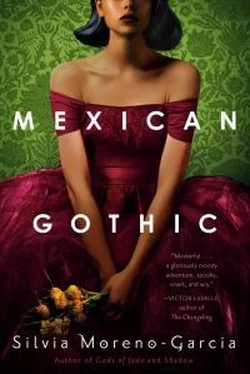
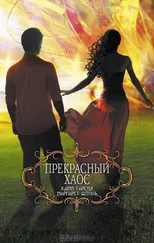
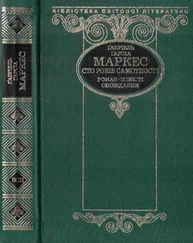


![Сильвия Морено-Гарсия - Боги нефрита и тени [litres]](/books/431579/silviya-moreno-garsiya-bogi-nefrita-i-teni-litres-thumb.webp)
![Сильвия Морено-Гарсия - Мексиканская готика [litres]](/books/431998/silviya-moreno-garsiya-meksikanskaya-gotika-litres-thumb.webp)

